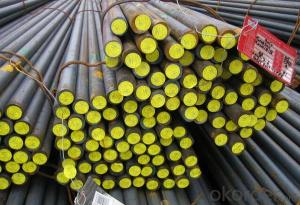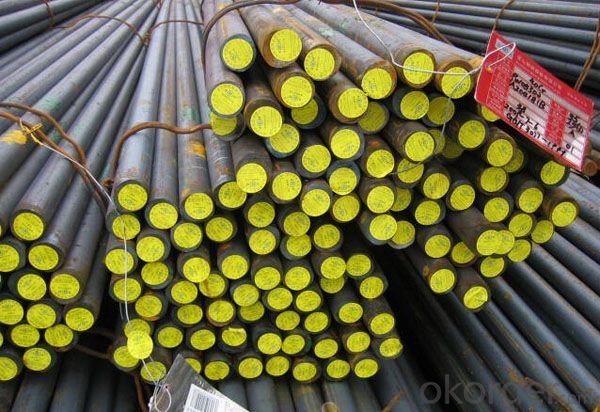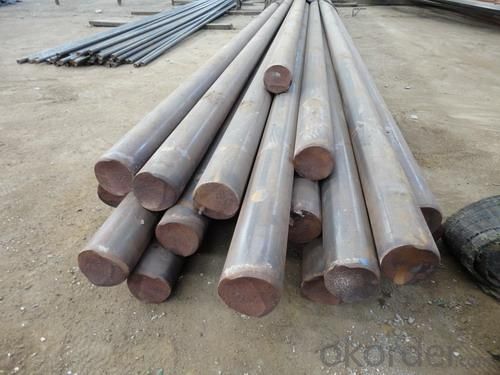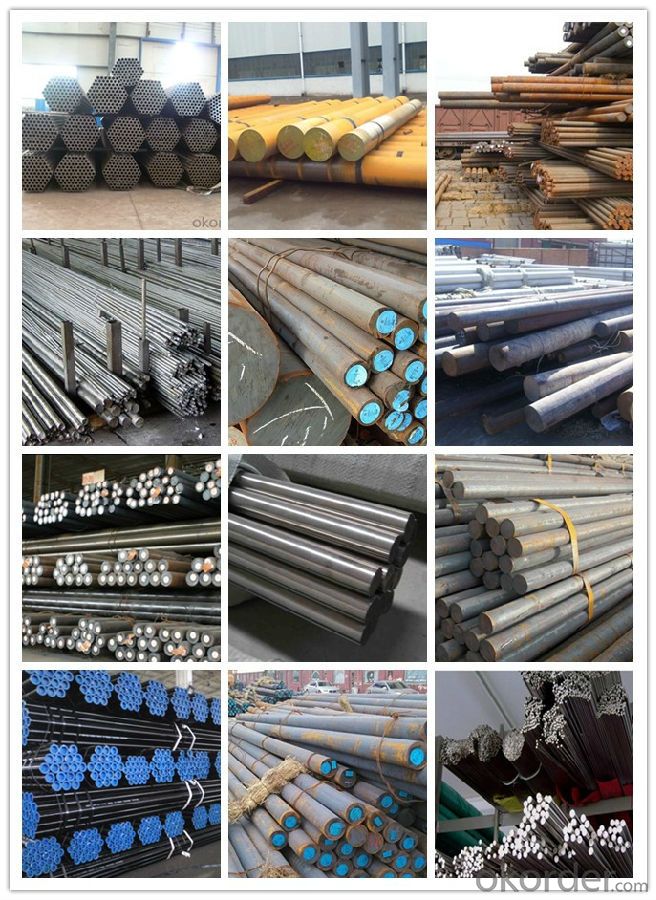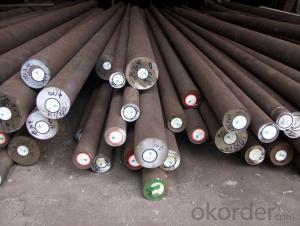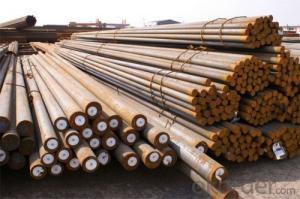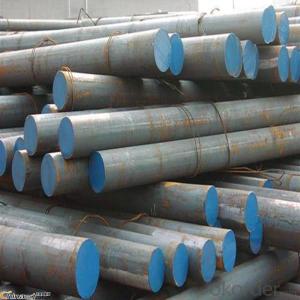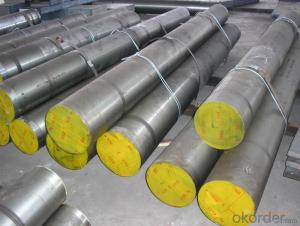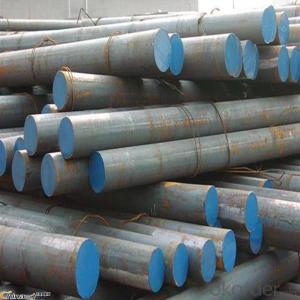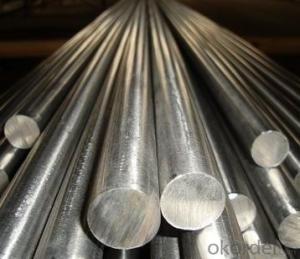Special Steel SAE4140 Alloy Steel Round Bar
- Loading Port:
- China main port
- Payment Terms:
- TT OR LC
- Min Order Qty:
- 30 m.t.
- Supply Capability:
- 10000 m.t./month
OKorder Service Pledge
OKorder Financial Service
You Might Also Like
Specification
Product information
1. Grade: 4140,SAE4140, 42CrMo4, 1.7225,SCM440
2. Specification: Dia: 16~800mm Length:2000-13000mm or as required
3. Process: EAF+LF+VD
4. Technique:Forged
5.Treatment:hot rolled,cold drawn
6.Mechanical performance:
Strength of extension | 1080MPA |
Yield point | 930MPA |
Elongation | 12% |
Contractibility rate | 45% |
Impacting energy | 63J |
7.Chemical composition(for reference only):
Grade | C | Si | Mn | P≤ | S≤ | Cr | Mo |
SAE4140 | 0.38/0.43 | 0.15/0.35 | 0.75/1.00 | 0.035 | 0.035 | 0.80/1.10 | 0.15/0.25 |
8. Compared grades of 4140 steel
GB-China | AISI-America | DIN-GERMANY | JIS-Japan |
42CrMo | 4140 | 1.7225 42CrMo4 | SCM440 |
Product show
Workshop show
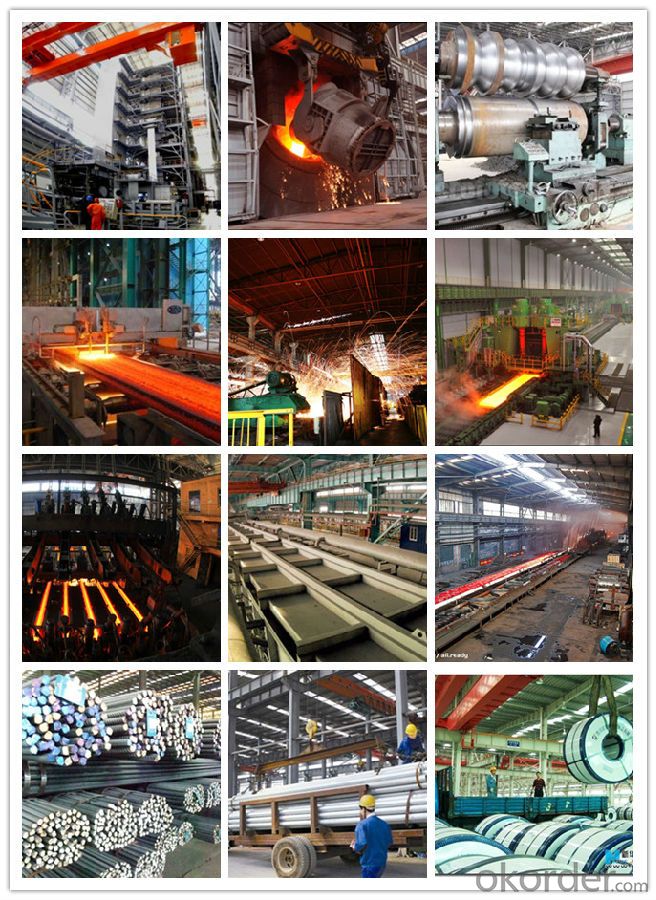
Shipping
1. FedEx/DHL/UPS/TNT for samples, Door-to-Door;
2. By Air or by Sea for batch goods, for FCL; Airport/ Port receiving;
3. Customers specifying freight forwarders or negotiable shipping methods!
Delivery Time: 3-7 days for samples; 5-25 days for batch goods.
Payment Terms
1.Payment: T/T, L/C, Western Union, MoneyGram,PayPal; 30% deposits; 70% balance before delivery.
2.MOQ: 1pcs
3.Warranty : 3 years
4.Package Informations: 1) EXPORT, In 20 feet (GW 25 ton) or 40 feet Container (GW 25 ton)
2)as customer's requirement
Why choose us?
(1) The leading exporter in China special steel industry.
(2) Large stocks for various sizes, fast delivery date.
(3) Good business relationship with China famous factories.
(4) More than 7 years steel exporting experience.
(5) Good after-sales service guarantee.
- Q: What are the main advantages of using special steel in the aerospace industry?
- The main advantages of using special steel in the aerospace industry include its high strength-to-weight ratio, excellent fatigue resistance, and good corrosion resistance. Special steel can withstand extreme temperatures and pressures, making it ideal for critical components like aircraft engines and landing gear. Additionally, its superior mechanical properties and reliability contribute to improved safety and performance in aerospace applications.
- Q: How does special steel contribute to the strength of products?
- Special steel contributes to the strength of products through its unique composition and manufacturing process. By incorporating specific alloys and heat treatments, special steel enhances the material's durability, toughness, and resistance to wear and corrosion. This increased strength allows products made from special steel to withstand higher loads, pressures, and extreme conditions, making them more reliable and long-lasting.
- Q: What are the machining techniques for special steel?
- There are several machining techniques that can be used for special steel, including turning, milling, drilling, and grinding. These techniques involve using specialized tools and equipment to shape and remove material from the steel in order to achieve the desired dimensions and surface finish. Additionally, heat treatment processes such as annealing or tempering may be applied to further enhance the properties of the special steel after machining.
- Q: What are the common surface treatments applied to special steel?
- The common surface treatments applied to special steel include galvanization, powder coating, painting, electroplating, and heat treatment.
- Q: What are the main applications of special steel in the packaging industry?
- Special steel is widely used in the packaging industry for a range of applications. One of the main uses is in the manufacturing of packaging machinery, such as filling machines, sealing machines, and wrapping machines, where the high strength and durability of special steel components ensure smooth operation and longevity. Additionally, special steel is utilized for the production of packaging tools, like cutters, blades, and molds, which require resistance to wear and corrosion. The use of special steel in the packaging industry helps to enhance productivity, improve product quality, and ensure the safety and integrity of packaged goods.
- Q: What are the applications of tool steel?
- Tool steel has numerous applications in various industries. Some common applications include the manufacturing of cutting tools such as drills, saw blades, and milling cutters. It is also used in the production of dies and punches for metal forming processes. Additionally, tool steel finds applications in the automotive industry for the production of engine components, gears, and shafts. It is also used in the construction industry for manufacturing tools and equipment for cutting, drilling, and shaping materials like wood and concrete. Overall, tool steel is valued for its high hardness, wear resistance, and ability to withstand high temperatures, making it ideal for applications that require durability and precision.
- Q: What are the different carburizing techniques used for special steel?
- There are several carburizing techniques used for special steel, including pack carburizing, gas carburizing, and vacuum carburizing. Pack carburizing involves placing the steel in a container with a carbon-rich material, such as charcoal or coke, and heating it to high temperatures. Gas carburizing involves introducing a carbon-rich gas, such as methane or propane, into a furnace where the steel is heated. Vacuum carburizing utilizes a low-pressure atmosphere to introduce carbon into the steel at high temperatures. Each technique has its own advantages and is chosen based on factors such as desired depth of carburization, time constraints, and the type of steel being treated.
- Q: What are the common alloys used in special steel?
- Some common alloys used in special steel include stainless steel (which contains chromium and often nickel), tool steel (which contains tungsten, vanadium, and sometimes cobalt), and high-speed steel (which contains tungsten, molybdenum, and sometimes cobalt).
- Q: What are the different surface hardening methods used for special steel?
- There are several different surface hardening methods that are commonly used for special steel. These methods are employed to improve the hardness and wear resistance of the steel, making it suitable for specific applications. Some of the most commonly used surface hardening methods for special steel include: 1. Carburizing: Carburizing is a heat treatment process that involves introducing carbon into the surface of the steel. This is typically done by heating the steel in a carbon-rich environment, such as a gas or liquid containing carbon. The carbon diffuses into the steel, forming a high-carbon layer on the surface. This process increases the hardness and wear resistance of the steel, making it suitable for applications that require high strength and durability. 2. Nitriding: Nitriding is a surface hardening process that involves introducing nitrogen into the surface of the steel. This is typically done by heating the steel in an atmosphere of ammonia gas. The nitrogen diffuses into the steel, forming a nitride layer on the surface. Nitrided steel exhibits high hardness, improved wear resistance, and increased fatigue strength. This method is commonly used for applications that require high surface hardness, such as gears, bearings, and tools. 3. Induction hardening: Induction hardening is a localized surface hardening method that involves heating only specific areas of the steel using electromagnetic induction. The heated areas are then rapidly quenched, resulting in a hardened surface layer. Induction hardening is often used for components that require high surface hardness, such as shafts, gears, and camshafts. It offers precise control over the hardened area, resulting in improved wear resistance and fatigue strength. 4. Flame hardening: Flame hardening is a surface hardening method that involves heating the steel surface using a high-temperature flame and then rapidly quenching it. The localized heating and quenching process produces a hard surface layer, while the core of the steel remains relatively unchanged. This method is commonly used for large and complex-shaped components, such as axles, crankshafts, and machine tool slides. 5. Laser hardening: Laser hardening is a precise and localized surface hardening method that involves using a high-energy laser beam to heat and melt the surface of the steel. The laser beam is moved across the surface to create a hardened layer. Laser hardening offers precise control over the hardened area, resulting in improved wear resistance and fatigue strength. It is commonly used for small and intricate components, such as cutting tools, molds, and dies. These are just a few of the surface hardening methods commonly used for special steel. Each method offers unique advantages and is chosen based on the specific requirements of the application. By employing these surface hardening methods, special steel can be tailored to meet the demands of various industries, including automotive, aerospace, and manufacturing.
- Q: What are the safety considerations when working with special steel?
- When working with special steel, there are several important safety considerations to keep in mind. Firstly, it is crucial to wear appropriate personal protective equipment (PPE) such as safety glasses, gloves, and protective clothing to prevent any potential injury. Special steel may have sharp edges or contain hazardous materials, so precautions should be taken to avoid cuts or exposure to harmful substances. Additionally, special steel may require specific handling techniques due to its weight or complexity. It is important to follow proper lifting and handling procedures to prevent strains or accidents. Furthermore, working with special steel often involves the use of heavy machinery or tools, so operators must be trained and qualified to operate such equipment safely. Another safety consideration is the potential for fire or explosion. Depending on the type of special steel, it may have specific flammability properties, and appropriate fire prevention measures should be implemented. This includes having fire extinguishers readily available and ensuring a safe working environment free from any potential ignition sources. Lastly, proper ventilation is crucial when working with special steel, as certain processes may release harmful fumes or gases. Adequate airflow and ventilation systems should be in place to minimize the risk of respiratory issues or chemical exposure. By considering these safety measures, workers can mitigate potential hazards and create a safer working environment when dealing with special steel.
Send your message to us
Special Steel SAE4140 Alloy Steel Round Bar
- Loading Port:
- China main port
- Payment Terms:
- TT OR LC
- Min Order Qty:
- 30 m.t.
- Supply Capability:
- 10000 m.t./month
OKorder Service Pledge
OKorder Financial Service
Similar products
Hot products
Hot Searches
Related keywords
